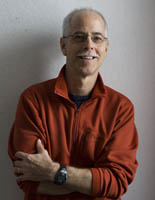‘Resurrecting Images from the Great Depression’ One of Two Feature Presentations at Johnny Cash Heritage Festival
When author and professor Bill McDowell presents “Resurrecting Images from the Great Depression,” at the Johnny Cash Heritage Festival, he will explore how images created in the 1930s and never intended for publication help America relate to its past.
The images were originally taken by Farm Security Administration photographers during the Great Depression to document the plight of the American farm worker, and later “killed” by FSA director Roy Stryker. After choosing the negatives which would be printed to photographs, Stryker used a hole punch to deface the remaining negatives, sometimes with two or more holes. Although the images were not intended for printing and publication, the punched negatives did remain with the collection and eventually became the property of the Library of Congress and were digitized and made available online.
McDowell stumbled upon one of the images years ago in a magazine and later decided to assemble them into what he calls a “long visual poem,” and publish them in his book, Ground: A Reprise of Photographs from the Farm Security Administration (FSA). All of the images feature at least one black circle from where Stryker’s hole punch marked the negative.
McDowell will be one of two featured presenters at the Oct. 19-21, festival in Dyess. Along with author and professor Michael Streissguth, who will present “American Culture and the Art of Johnny Cash,” McDowell will close out the three-day symposium leading up to the “Cash cotton field” concert that brings the festival to a close.
Rosanne Cash, eldest daughter of Johnny Cash, will introduce the featured presentations Saturday, Oct. 21, before co-headlining the field concert with Kris Kristofferson, one of the great songwriters in American history. The Saturday presentations by McDowell and Streissguth will begin at 9 a.m. at the Dyess Community Center, with the field concert beginning at 12:15 p.m. adjacent to the Johnny Cash Boyhood Home. McDowell’s book is prefaced with the lyrics to the Rosanne Cash song, “The Sunken Lands,” a tribute to the hardships of life in Depression-era Dyess.
“I downloaded thousands of these,” said McDowell. “Pictures from all over the country, made in cities, towns and out in the country. Then, the recession of 2008 came and that started people writing about how that compared to the Great Depression. That got me thinking about all of these great photographs, and the black circle looked to me like a contemporary mark. What if I put a group of these pictures together, could they say something about today and the 1930s?”
“I began to select photographs that were not immediately dateable to the 1930s, and began to think about what we share most profoundly with 1930s America – and that was the land,” McDowell continued. “The land that we share and what we get from the land – food, water and shelter. I started with just landscapes, then began to incorporate some agricultural scenes and agricultural domestic scenes. The idea behind it was that the black hole in its appearance as a contemporary mark joins the issues today with the issues of the 1930s.”
For his book, McDowell selected the photographs based on the image itself, and how the black hole impacted the frame and the subject matter, spending countless hours organizing hundreds of photos on his studio wall.
“It became endlessly interesting how the nuances of that black circle impacted that scene,” he said. “I just kept playing with it and eventually it made more and more visual sense. I think it is important to note that this is an artist’s book. The black hole gave the images something that they wouldn’t have without it. Unwittingly, when Stryker punched the hole, he gave us a new photograph.”
“For the photographs to have relevance today, that is also part of the process that has taken form since the 1930s,” McDowell continued. “All of the work that has been done between then and now has influenced the way we think about that black circle. It is very much like reinterpreting music from the past. And that is something that Rosanne and her father did so beautifully.”
The symposium will run from 1-5 p.m. Thursday, Oct. 19, in the Colony Visitors Center, and again Friday from 9 a.m. until 5 p.m., before concluding Saturday morning. There is no charge to attend the symposium, but those with plans to attend are asked to register online in advance at http://JohnnyCashHeritageFestival.com/presentation-registration/
In addition to the symposium and the Saturday concert, regional music performances will be held Oct. 19 and 20 during KASU Music Nights at the festival. Nine regional acts will entertain at the Dyess Colony Circle over the two-day span, and all Thursday and Friday performances at the Johnny Cash Heritage Festival are free. The festival will also include a “Memories of a Lifetime” oral history project, and food vendors, arts and crafts booths, and demonstrations throughout the three days.
Along with performances by Kristofferson and Rosanne Cash at the Saturday concert, Northeast Arkansas native Buddy Jewell will open the concert at 12:15 p.m., followed by Joanne and Tommy Cash at 1:30 p.m. Tickets are on sale now and available online at AState.edu/tickets, or at the A-State Convocation Center Box Office on the A-State campus (lower red entrance), or by calling 870-972-2781 or 800-745-3000. Reserved seating at the $100 and $50 level is sold out, but $25 general admission tickets remain on sale.
# # #






